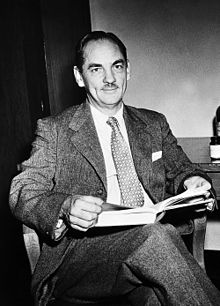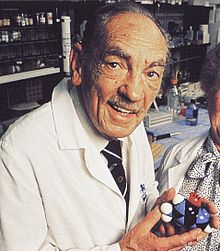George H. Hitchings
George Herbert Hitchings (born April 18, 1905 in Hoquiam, Washington; † February 27, 1998 in Chapel Hill, North Carolina) was a US biochemist and pharmacologist. He was a long-time research director of Burroughs Wellcome & Company.
In 1988, together with James W. Black and Gertrude Elion, he received the Nobel Prize in Physiology or Medicine for biochemical discoveries that opened up new drug therapy options. In particular, he conducted research on the differences in the nucleic acid metabolism of human cells, cancer cells, bacteria, viruses and protozoa. The knowledge thus gained contributed significantly to improving the fight against infections and cancer cells by chemotherapy. He had already received a Gairdner Foundation International Award in 1968.
Hitchings attended Franklin High School in Seattle and studied at the University of Washington beginning in 1923, earning a bachelor's degree in chemistry in 1927 and a master's degree in 1928 with a thesis prepared at the university's marine biology station in Puget Sound. He continued his studies at Harvard University and received his doctorate from Harvard Medical School in 1933. He then did research at Harvard and at Case Western Reserve University, and from 1942 was at the Wellcome Research Laboratories, where his collaboration with Gertrude Elion began. Drugs he was involved in developing included pyrimethamine (for malaria), mercaptopurine (a cytostatic for leukemia), tioguanine (a cytostatic), allopurinol (for gout), azathioprine (immunosuppressant), and trimethoprim (an antibiotic).
In 1967 he became vice president for research at Burroughs-Wellcome. He retired in 1976. In addition to his work at Wellcome, he taught at Duke University School of Medicine. In 1977 he was elected to the National Academy of Sciences, and in 1991 to the American Academy of Arts and Sciences.

George Herbert Hitchings

George Herbert Hitchings, 1988
Search within the encyclopedia